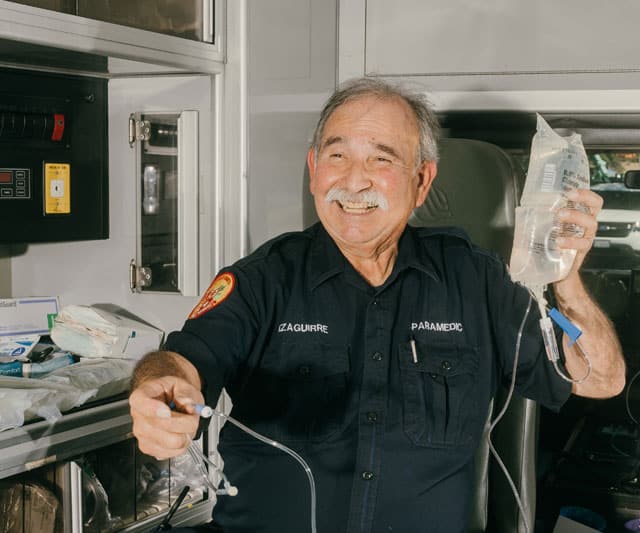Editor’s note: Lewis Walker is a columnist for Rethinking65. Read more of his articles here.

The first of the Baby Boomer generation cohort, those born in 1946, will turn age 80 in 2026. The oldest members of Generation X, those born between 1965 and 1980, the boomer’s offspring, began turning 60 this year, 2025. Our population is aging, and for the first time in American history the Census Bureau asserts that by 2034 adults age 65 and over will outnumber people under age 18. Currently one of six people in the U.S. is age 65 or older.
Auguste Comte, the 19th century French philosopher and mathematician, observed that “demography is destiny.” It is, and the graying of America is a major marketing opportunity for forward-thinking and practice-building entrepreneurial financial planners.
A big reason is that Americans are not ready for the costly, disruptive, and largely unplanned major life transitions associated with aging and family medical care emergencies.
‘The Day That You Become Old”
“How do you know the day that you become old?” legendary business leader Warren Buffet said in a recent interview with The Wall Street Journal, while discussing his decision to turn the leadership of Berkshire Hathaway over to his successor Greg Abel. Buffet continued that he started getting old at about 90.
The realities of aging may sneak up on you with the sudden realization that you really like naps. For too many, it’s an unexpected “wake up call” — the shock of a sudden heart attack or stroke, a nasty fall with broken bones, a doctor delivering the news that “you have cancer,” a major accident, some other startling medical or cognitive diagnosis, or the sudden passing of your longtime life partner.
The National Council on Aging notes that about 80% of older adults have at least one chronic disease and 68% have two. A 2017 survey by CVS Health indicated that the most common chronic diseases are hypertension, 42%; arthritis, 42%; and diabetes, 20%.
While television and radio ads and other promotions tout a happy retirement with dreams of cruising to exotic locales, trips to the emergency room are far more prevalent as the Age Wave rolls on and the burdens associated with chronic disease grow.
More seniors are reporting bouts of depression and chronic pain. Along with these health challenges, many face the harsh reality of financial stress about how to afford the care they need. This burden extends beyond the seniors themselves, affecting family members who often step in to help care for their aging loved ones —both emotionally and physically.
Additional Reading: Is a Well-Funded, Restful Retirement Possible?
What American Isn’t Prepared For
As financial planning professionals we spend years exhorting people to build diversified portfolios and to take other measures to plan for an active and independent lifestyle upon retirement. But like Warren Buffett, when a senior suddenly feels old, when his or her “get-up-and-go got up and went” — and when walking, bathing, dressing or feeding oneself becomes difficult, or driving becomes dangerous — who steps in?
It may be a spouse, but more often than not it is a daughter or a son who rises to the occasion to help mom or dad, the sudden widow or widower, cope with loss.
Over the last four years, I’ve been on both ends – as a caregiver and as a care recipient — and can tell you that America is not ready for the disruptive emotional and financial realities of the Gray Tsunami.
My Personal Experience
The reality of putting my wife of 55 years into “hospice at home,” knowing that she was dying, was one of the hardest things I’ve ever faced. She passed away, and a little over a year later I was diagnosed with cancer, Hodgkin lymphoma. I was very sick, from a difficult reaction to chemotherapy, and had to spend excessive time in a hospital.
Before I was discharged from the hospital, my daughter said, “Dad, you can’t go home. There’s no one there to care for you.” She found a place in an upscale age 55-plus senior living facility in suburban Atlanta, where I now reside.
Like Mr. Buffett, it took me a long time to realize that I was aging. I sold my financial planning practice at age 77. This August I will turn age 87. It’s 13 short years to age 100. Since only 1% of the population lives to 100, the odds of my going to see my Lord and creator in the next 13 years are about 99%.
I’m okay with that. Truly I am blessed. My cancer is in remission. I did what I instructed my clients to do, and planned well. And I’m still active.
I am president of the resident council in the senior community where I reside and vice chairman of the board of directors of an Atlanta-based company that provides support services to independent financial advisors. I still have meaning, purpose and things to keep me busy and engaged. What I am about to tell you comes from my real-life experience, a frustrating and sudden major life transition. It’s the kind of thing that Susan Bradley, head of the Sudden Money Institute, has warned financial advisors about for years.
Enter the Alpha Child
Over 90% of the time, the child who steps in to help mom or a dad is a daughter. It may be a son, and they do get involved, but most of the time it is a daughter. Who, then, is the “alpha daughter?”
Generally, she’s a married woman between age 45 and 55, with children. She and her spouse have busy lives, working hard to maintain their lifestyle relative to their home and careers. They may have kids in college with the costs of education straining family budgets. They may have a younger “surprise baby” still in high school, or even middle school, given trends toward later-in-life marriages and couples not having their first child until they are in their thirties.
A loved one falls and breaks a hip, has a heart attack or a stroke, is diagnosed with cancer, or is in a serious auto accident with severe and debilitating injuries. The alpha child gets a late-night call that mom or dad is in the hospital. Now what?
Key Questions
A key first question is, who has the authority to make medical decisions for the loved one if he or she cannot act for himself or herself? Do mom or dad and the alpha child have a durable power of attorney for healthcare so medical information can be received and decisions made, and a durable power of attorney for assets so bills can be paid?
Is there an advance healthcare directive in place that details who can speak for the loved one — and delineates wishes regarding medical decisions? If a serious health condition exists, a physician orders for life-sustaining treatment document (POLST) can complement the advance directive by specifying wishes relative to medical treatments such as cardiopulmonary resuscitation (CPR), a ventilator for breathing, antibiotics and IV fluids, artificial nutrition by tube, and even religious considerations such as a receiving a Holy Communion wafer. Is organ or tissue donation a factor?
The ownership of significant assets should also be reviewed in case the alpha child has to raise liquid funds to pay bills. How are assets titled? This includes the primary residence; a vacation home; investment assets such as money market and savings accounts, stocks, bonds, real estate, alternative investments; artwork or other tangibles; and a closely-held business interest.
Keep in mind that a will only works when you’re dead. A revocable living trust may be a useful tool, especially if assets are located in a different state than one’s primary residence. Note: A financial advisor may not give legal advice if they are not a qualified attorney. You may, however, raise key questions for discussion with qualified counsel.
These questions are particularly powerful when dealing with closely-held business owners who may or may have not thought about issues of succession and who runs the show in case of temporary or permanent disability. “Exit planning” is a hot topic, but you should be on the team as a valued and respected advisor to the owner’s family long before the money moves after a business is sold.
Market to Mom and the Alpha Child
According to a Cerulli Associates 2021 post, 70% of heirs are likely to fire or change financial advisors after inheriting wealth from a parent or spouse. Stated Cerulli, “More than ever, advisors need to establish an intergenerational continuity plan to retain assets.” Burn that statement into your marketing brain.
Commonly cited statistics indicate there are roughly 11 million widows and 3 million widowers in the U.S. Guys, when you’re talking with a couple, don’t give him more attention than you give her. Make eye contact. Learn what her challenges are, find out what worries her, and engage her in the conversation. In my 40 years of practice, often the women made the first phone call to my office to set up an appointment for an initial conversation as couples shopped for an advisor.
It’s supposedly “a new world,” but some things are fundamental. Talk to church groups and women’s groups. Most every married woman knows another woman who has lost a husband or who is dealing with aging parents. Women face a myriad of pressures.
Ask this key question: Looking out over the next 10 years, and 10 years beyond that, what challenges do you see, positive or negative?” When you ask a woman that question, she will often tell you everything that worries her! It amazed me what they would reveal in the first meeting. They are worried about the very things cited in this commentary.
Hold family meetings, especially with mom, dad and the alpha daughter and/or son. The best way to keep money in your practice is to ensure mom, dad and the downline generations are happy, well-served clients. Being aware of the implications inherent in the gray tsunami, while offering planning strategies and solutions, is the way to build a solid client base as you help to grow generational wealth that will stay with you.
Lewis J. Walker, MBA, CFP®, CEPA, graduated with the third class from the College of Financial Planning in 1975. He served for many years on the board of the Institute of Certified Financial Planners (ICFP), and serving as national president and chairman. The ICFP was a forerunner of the Financial Planning Association (FPA). Honored by the FPA as a pioneer in the profession of financial planning, Lewis was a recipient of the P. Kemp Fain, Jr., Award in 2011. Now retired from active practice, Lewis continues to serve as Vice Chairman of the Board of Atlanta-based SFA Holdings, Inc., parent company of The Strategic Financial Alliance (SFA) and SFA Partners, organizations which provide a myriad of support services to independent financial advisors.







